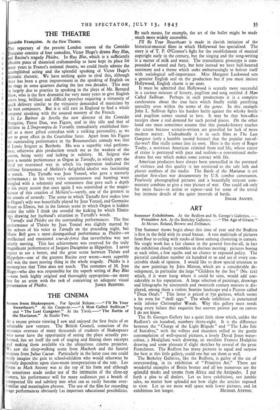THE THEATRE
medie Franeaise. At the New Theatre.
E repertory of the present London season of the Comedic rancaise consists of four comedies, Victor Hugo's drama Ruy Bias, Racine's tragedy Phedre. In•Ruy Bias, which is a sufficiently ffective piece of theatrical craftsmanship to have kept its place for y years in France's national theatre, we could freely admire the ccomplished acting and the splendid speaking of Victor Hugo's amatic rhetoric. We have nothing quite to rival this, although ere has been a great improvement in the speaking of English on e stage in some quarters during the last two decades. This may ' ■be largely due to practice in speaking in the plays of Mr. Bernard Shaw, who is the first dramatist for very many years to give English actors long, brilliant and difficult speeches requiring a virtuosity of quick delivery similar to the virtuosity demanded of musicians by the best composers. But it is still rare in England •to find a whole f company speaking with the assured mastery of the French. In Le Barbier de . Seville the new director of the Comedic Francaise, Pierre Dux, was Figaro, and in this role and that of Moliere in L'Impromptu de Versaille immediately established him- self as a, most gifted comedian with a striking personality, as we saw to great effect in the Courteline farce. Apart from his Figaro the outstanding performance in the Beatunarchais comedy was that of Louis Seigner as Bartholo. His was a superbly vital perform- ance, otherwise this production struck me as the weakest of the season, being noisy and lacking in subtlety. M. Seigner also gave a notable performance as Orgon in Tartuffe, in which part the vivid yet restrained way in which his expression indicated . the, sublime fatuousness of Moliere's delightful idealist was fascinating to watch. The Tartuffe was Jean Yonnel, who gave a masterly performance ; in his very voice unctuousness and humbug were, mingled with a solemnity and seriousness that gave such a depth to his every accent that once again I was astonished at the Magni- ficence of this creation of Moliere'ssurely, one of the greatest in the annals of comedy. The scene in which Tartuffe first makes love to Organ's wife was beautifully played by Jean Yonnel, and Germaine Rouer as Elinire, but in the famous scene in which Organ is hidden under the table I think she overdid the kicking by which Elmire was drawing her husband's attention to Tartuffe's words. iTartuffe and Phadre are the outstanding performances. The fine performance of Thesee by Jean Yonnel was slightly marred by the echoes of his voice as Tartuffe on the preceding night, but Marie Bell gave a most -distinguished performance as Phedre—an intellectual and emotional tour-de-force that nevertheless was not utterly moving. This last achievement was reserved for the trtily magnificent performance of Jacques Dacqmine as Hippolyte. I never expect to see a better, and the great scene between Thesee and Hippolyte—one of the greatest Racine ever wrote—went superbly and was the most moving thing in the whole tragedy. Phadre is a masterpiece that Time does not touch. The costumes of M. Jean Hugo—who also was responsible for the superb setting of Ruy Bias —were both highly original and thoroughly appropriate—no mean feat for an artist with the task of conceiving an adequate visual


























 Previous page
Previous page